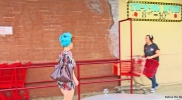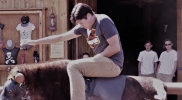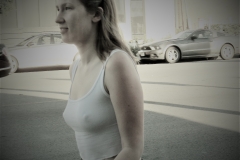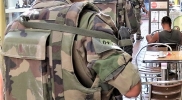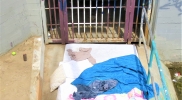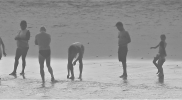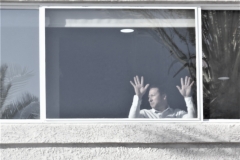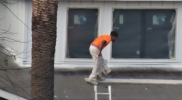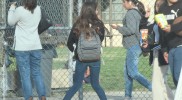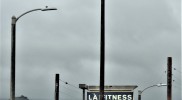|
|
Best Poems - Relationships
Best Poems – RELATIONSHIPS
|
| The Video – Fleur Adcock
“When Laura was born, Ceri watched.
They all gathered around Mum’s bed—
Dad and the midwife and Mum’s sister
and Ceri. ‘Move over a bit,’ Dad said—
he was trying to focus the camcorder
on Mum’s legs and the baby’s head.
After she had a little sister,
and Mum had gone back to being thin,
and was twice as busy, Ceri played
the video again and again.
She watched Laura come out, and then,
in reverse, she made her go back in.” |
|
|
| First Lesson – Philip Booth
“Lie back daughter, let your head
be tipped back in the cup of my hand.
Gently, and I will hold you. Spread
your arms wide, lie out on the stream
and look high at the gulls. A dead-
man’s float is face down. You will dive
and swim soon enough where this tidewater
ebbs to the sea. Daughter, believe
me, when you tire on the long thrash
to your island, lie up, and survive.
As you float now, where I held you
and let go, remember when fear
cramps your heart what I told you:
lie gently and wide to the light-year
stars, lie back, and the sea will hold you.” |
|
|
| Choices – Sterling A. Brown
“Don’t want no yaller gal, dat’s a color will not stay,
Don’t want no yaller, yaller nevah known to stay,
Git caught in a storm, de yaller sho’ will fade away.
Don’t want no pretty pink, pink ain’t de shade fo’ me,
Don’t want no pretty pink, pink it ain’t de shade fo’ me,
When you think you’s got her, ain’t nuffin’ but yo’ used to be.
Don’t want no black gal, gums blue lak de sea,
Don’t want no blue gums, blue jus’ lak de deep blue sea,
Fraid that when I kiss her, bluine run all over me.
Don’t want no brownskin, choklit to de bone,
Don’t want no brownskin, choklit to de bone,
Choklit melts jus lak vanilla, and runs all out de cone.
Don’t want no charcoal, soot’s a mess what I despise,
Don’t want no charcoal, soot’s a mess what I despise,
Want to know whah my gal’s at, anytime she shets her eyes.
Don’t want no Geechie gal, talkin’ lak a nachel zoo,
don’t want no Geechie, talkin’ lak a nachel zoo,
Jabber lak a monkey, make a monkey outa you.
Don’t care for de Ofays, got no dealins wif Miss Ann,
Don’t care for de Ofay, got no dealins wif Miss Ann,
Don’t lak her brother Hemp, no her cousin Mr. Cool Oil Can.
Don’t want me no Injin, no Injin squaw of red,
Don’t want me no Injin, no Injin squaw of red,
Ain’t got much hair, want it left on top my frazzly head.
Don’t want no blue woman, moanin’ wid de lonesome blues,
Don’t want no blue woman, moanin’ wid de graveyard blues,
Got mo’ blues myself now dan a man could evah use.
Gonna git me a green gal, if a green gal’s to be found,
Git me a green gal, if a green gal is to be found,
But I spec’ she ain’t born yet, and her mama she in the ground.” |
| What I Heard At The Discount Department Store – David Budbill
“Don’t touch that. And stop your whining too.
Stop it. I mean it. You know I do.
If you don’t stop, I’ll give you fucking something
to cry about right here
and don’t you think I won’t either.
So she did. She slapped him across the face.
And you could hear the snap of flesh against the flesh
halfway across the store. Then he wasn’t whining anymore.
Instead, he wept. His little body heaved and shivered and wept.
He was seven or eight. She was maybe thirty.
Above her left breast, the pin said: Nurse’s Aide.
Now they walk hand in hand down the aisle
between the tables piled with tennis shoes
and underpants and plastic bags of socks.
I told you I would. You knew I would.
You can’t get away with shit like that with me,
you know you can’t.
You’re not in school anymore.
You’re with your mother now.
You can get away with fucking murder there,
but you can’t get away with shit like that with me.
Stop that crying now I say
or I’ll give you another little something
like I did before.
Stop that now. You’d better stop.
That’s better. That’s a whole lot better.
You know you can’t do that with me.
You’re with your mother now.” |
|
|
| my old man – Charles Bukowski
“16 years old
during the depression
I’d come home drunk
and all my clothing—
shorts, shirts, stockings—
suitcase, and pages of
short stories
would be thrown out the
street.
my mother would be
waiting behind a tree:
‘Henry, Henry, don’t
go in… he’ll
kill you, he’s read
your stories…’
‘I can whip his
ass…’
‘Henry, please take
this… and
find yourself a room.’
but it worried him
that I might not
finish high school
so I’d be back
again.
one evening he walked in
with pages of
one of my short stories
(which I had never submitted
to him)
and he said, ‘this is
a great short story.’
I said, ‘o.k.’
and he handed it to me
and I read it.
it was a story about
a rich man
who had a fight with
his wife and had
gone out into the night
for a cup of coffee
and had observed
the waitress and the spoons
and forks and the
salt and pepper shakers
and the neon sign
in the window
and then had gone back
to his stable
to see and touch his
favorite horse
who then
kicked him in the head
and killed him.
somehow
the story held
meaning for him
though
when I had written it
I had no idea
of what I was
writing about.
so I told him,
‘o.k., old man, you can
have it.’
and he took it
and walked out
and closed the door.
I guess that’s
as close
as we ever got.” |
|
|
| freaky time – Charles Bukowski
“the lady down at the end of the bar keeps looking at
me, I put my head down, I look away, I light
a cigarette, glance again: she’s still staring at me, she’s
charmingly dressed and she, herself, well, you might
say she’s beautiful.
her eyes meld with mine; I am
elated and nervous, then
she gets up, goes to the ladies’ room:
such a behind!
such grace!
what a gazelle!
I glance at my face it the bar mirror, look
away.
she’s back; then the barkeep comes down: ‘a drink
from the lady at the end of the bar.’
I nod thinks to her, lift my drink, smile, have a
hit.
she is looking again, what a strange and pleasur-
able experience.
I look forward, examine the backs of my hands—not
bad hands as far as hands go.
then, at once, it occurs to me:
she has mistaken me for somebody
else.
I leave my stool and slowly walk to the exit,
and out into the night; I walk half a block down the
boulevard, feel the need for a smoke, slip the
pack of cigarettes out of my coat pocket, look
curiously at the brand name (I did not purchase
these) DEATH, it
says.
I curse, hurl the pack into the street, move toward
the next bar: knew it all along: she was a
whore.” |
|
|
Love Poem – Richard Brautigan
“It’s so nice
to wake up in the morning
all alone
and not have to tell somebody
you love them
when you don’t love them
any more.”
|
|
|
| A Publisher To His Client – Lord Byron
“Dear Doctor, I have read your play,
Which is a good one in its way,—
purges the eyes, and moves the bowels,
And drenches handkerchiefs like towels
With tears, that, in a flux of grief,
Afford hysterical relief
To shattered nerves and quickened pulses,
Which your catastrophe convulses.
I like your moral and machinery;
Your plot, too, has such scope for Scenery!
Your dialogue is apt and smart;
The play’s concoction full of art;
Your hero raves, your heroine cries,
All stab, and every body dies.
In short, your tragedy would be
The very thing to hear and see:
And for a piece of publication,
If I decline on this occasion,
It is not that I am not sensible
To merits in themselves ostensible,
But—and I grieve to speak it—plays
Are drugs—mere drugs, sir—now-a-days…
In short, Sir, what with one and t’other,
I dare not venture on another.
I write in haste; excuse each blunder;
The coaches through the street so thunder!…” |
|
|
| My Mother’s Belly – Blaise Cendrars
“It’s my first residence
It was all round
Often I imagine
What I was like . . .
My feet o your heart mama
My knees against your liver
My hand clutching at the canal
That ended at your womb
My back twisted in a spiral
My ears full my eyes empty
Everything shriveled tight
My head almost outside your body
My skull at your orifice
I enjoyed your health
The warmth of your blood
Daddy’s embraces
Often a hybrid fire
Electrified my darkness
A thump on my skull relaxed me
And I kicked against your heart
The big muscle of your vagina
Then squeezed tight again
I gave in sorrowfully
And you flooded me with your blood
My forehead is still bumpy
From these my father’s thumps
Why must we always give in
Half strangled like that?
If I could have opened my mouth
I would have bitten you
If I’d been able to talk
I would have said:
Shit, I don’t want to live!” |
|
|
| Admonitions – Lucille Clifton
“boys
i don’t promise you nothing
but this
what you pawn
i will redeem
what you steal
i will conceal
my private silence to
your public guilt
is all i got
girls
first time a white man
opens his fly
like a good thing
we’ll just laugh
laugh real loud my
black women
children
when they ask you
why is your mama so funny
say
she is a poet
she don’t have no sense” |
| In Defense of Adultery – Julia Copus
“We don’t fall in love: it rises through us
the way that certain music does—
whether a symphony or ballad—
and it is sepia-coloured,
like tea that stains as it creeps up
the tiny tube-like gaps inside
a cube of sugar lying by a cup.
Yes, love’s like that: just when we least
needed or expected it
a part of us dips into it
by chance or mishap and it seeps
through our capillaries, it clings
inside the chambers of the heart
to atriums and ventricles. We’re.
victims, we say: merely vessels,
drinking the vanilla scent
of this one’s skin, the lustre
of another’s blue eyes so skillfully
darkened with bistre. And whatever
damage might result we’re not
to blame for it: love is an autocrat
and won’t be disobeyed.
Sometimes we almost manage
to convince ourselves of that.” |
|
|
| Marriage – Gregory Corso
“Should I get married? Should I be good?
Astound the girl next door with my velvet suit and faustus hood?
Don’t take her to movies but to cemeteries
tell all about werewolf bathtubs and forked clarinets
then desire her and kiss her and all the preliminaries
and she going just so far and I understanding why
not getting angry saying You must feel! It’s beautiful to feel!
Instead take her in my arms lean against an old crooked tombstone
and woo her the entire night the constellations in the sky—
When she introduces me to her parents
back straightened, hair finally combed, strangled by a tie,
should I sit with my knees together on their 3rd degree sofa
and not ask Where’s the bathroom?
How else to feel other than I am,
often thinking Flash Gordon soap—
O how terrible it must be for a young man
seated before a family and the family thinking
We never saw him before! He wants our Mary Lou!
After tea and homemade cookies they ask What do you do for a living?
Should I tell them? Would they like me then?
Say All right get married, we’re losing a daughter
but we’re gaining a son—
And should I then ask Where’s the bathroom?
O God, and the wedding! All her family and her friends
and only a handful of mine all scroungy and bearded
just wait to get at the drinks and food—
And the priest! he looking at me as if I masturbated
asking me Do you take this woman for your lawful wedded wife?
And I trembling what to say say Pie Glue!
I kiss the bride all those corny men slapping me on the back
She’s all yours, boy! Ha-ha-ha!
And in their eyes you could see some obscene honeymoon going on—
Then all that absurd rice and clanky cans and shoes
Niagara Falls! Hordes of us! Husbands! Wives! Flowers! Chocolates!
All streaming into cozy hotels
All going to do the same thing tonight
The indifferent clerk he knowing what was going to happen
The lobby zombies they knowing what
The whistling elevator man he knowing
The winking bellboy knowing
Everybody knowing! I’d almost be inclined not to do anything!
Stay up all night! Stare that hotel clerk in the eye!
Screaming: I deny honeymoon! I deny honeymoon!
running rampant into those almost climactic suites
yelling Radio belly! Cat shovel!
O I’d live in Niagara forever! in a dark cave beneath the Falls
I’d sit there the Mad Honeymooner
devising ways to break marriages, a scourge of bigamy
a saint of divorce—
But I should get married I should be good
How nice it’d be to come home to her
and sit by the fireplace and she in the kitchen
aproned young and lovely wanting my baby
and so happy about me she burns the roast beef
and comes crying to me and I get up from my big papa chair
saying Christmas teeth! Radiant brains! Apple deaf!
God what a husband I’d make! Yes, I should get married!
So much to do! Like sneaking into Mr Jones’ house late at night
and cover his golf clubs with 1920 Norwegian books
Like hanging a picture of Rimbaud on the lawnmower
like pasting Tannu Tuva postage stamps all over the picket fence
like when Mrs Kindhead comes to collect for the Community Chest
grab her and tell her There are unfavorable omens in the sky!
And when the mayor comes to get my vote tell him
When are you going to stop people killing whales!
And when the milkman comes leave him a note in the bottle
Penguin dust, bring me penguin dust, I want penguin dust—
Yes if I should get married and it’s Connecticut and snow
and she gives birth to a child and I am sleepless, worn,
up for nights, head bowed against a quiet window, the past behind me,
finding myself in the most common of situations a trembling man
knowledged with responsibility not twig-smear nor Roman coin soup—
O what would that be like!
Surely I’d give it for a nipple a rubber Tacitus
For a rattle a bag of broken Bach records
Tack Della Francesca all over its crib
Sew the Greek alphabet on its bib
And build for its playpen a roofless Parthenon
No, I doubt I’d be that kind of father
Not rural not snow no quiet window
but hot smelly tight New York City
seven flights up, roaches and rats in the walls
a fat Reichian wife screeching over potatoes Get a job!
And five nose running brats in love with Batman
And the neighbors all toothless and dry haired
like those hag masses of the 18th century
all wanting to come in and watch TV
The landlord wants his rent
Grocery store Blue Cross Gas & Electric Knights of Columbus
impossible to lie back and dream Telephone snow, ghost parking—
No! I should not get married! I should never get married!
But—imagine if I were married to a beautiful sophisticated woman
tall and pale wearing an elegant black dress and long black gloves
holding a cigarette holder in one hand and a highball in the other
and we lived high up in a penthouse with a huge window
from which we could see all of New York and even farther on clearer days
No, can’t imagine myself married to that pleasant prison dream—
O but what about love? I forget love
not that I am incapable of love
It’s just that I see love as odd as wearing shoes—
I never wanted to marry a girl who was like my mother
And Ingrid Bergman was always impossible
And there’s maybe a girl now but she’s already married
And I don’t like men and—
But there’s got to be somebody!
Because what if I’m 60 years old and not married,
all alone in a furnished room with pee stains on my underwear
and everybody else is married! All the universe married but me!
Ah, yet well I know that were a woman possible as I am possible
then marriage would be possible—
Like SHE in her lonely alien gaud waiting her Egyptian lover
so i wait—bereft of 2,000 years and the bath of life.” |
|
Holy Cross Hospital – Toi Derricotte
In my ninth month, I entered a maternity ward set up for
the care of unwed girls and women in Holy Cross Hospital.
“couldn’t stand to see these new young faces, these
children swollen as myself. my roommate, snotty,
bragging about how she didn’t give a damn about the
kid and was going back to her boyfriend and be a
cheerleader in high school. could we ever ‘go back’?
would our bodies be the same? could we hide among the
childless? she always reminded me of a lady at the bridge
club in her mother’s shoes, playing her mother’s hand.
i tried to get along, be silent, stay in my own corner.
i only had a month to go—too short to get to know them.
but being drawn to the room down the hall, the t.v. room
where, at night, we sat in our cuddly cotton robes and
fleece-lined slippers—like college freshmen, joking
about the nuns and laughing about due dates: jailbirds
waiting to be sprung. . .
one girl, taller and older, twenty-six or twenty-seven, kept
to herself, talked with a funny accent. the pain on her face
seemed worse than ours. . .
and a lovely, gentle girl with flat small bones. the
great round hump seemed to carry her around! she never
said an unkind word to anyone, went to church every morning
with her rosary and prayed each night alone in her room.
she was seventeen, diabetic, fearful that she or the baby
or both would die in childbirth. she wanted the baby, yet
knew that to keep it would be wrong. but what if the child
did live? what if she gave it up and could never have another?
i couldn’t believe the fear, the knowledge she had of
death walking with her. i never felt stronger, eating
right, doing my exercises. i was holding on to the core,
the center of strength; death seemed remote, i could not
imagine it walking in our midst, death in the midst of
all that blooming.
she went down two weeks late. induced. she had decided
to keep the baby. the night i went down, she had just
gone into labor so the girls had two of us to cheer about.
the next morning when i awoke, i went to see her. she
smiled from her hospital bed with tubes in her arms. it
had been a boy. her baby was dead in the womb for two
weeks. i remembered she had complained no kicking. we
had reassured her everything was fine.
meanwhile i worked in the laundry, folded the hospital
fresh sheets flat three hours a day. but never alone.
stepping off the elevator, going up, feeling something,
a spark catch. i would put my hand there and smile with
such a luminous smile, the whole world must be happy.
or out with those crazy girls, those teenagers, laughing,
on a christmas shopping spree, free (the only day they
let us out in two months), feet wet and cold from snow.
i felt pretty, body wide and still in black leotards,
washed out at night. my shapely legs and
young body like iron.
i ate well, wanted lamaze (painless childbirth)—i
didn’t need a husband or a trained doctor—i’d do it
myself, book propped open on the floor, puffing and
counting while all the sixteen-year-old unwed children
smiled like i was crazy.
one day i got a letter from my cousin, said:
don’t give your baby up—
you’ll never be complete again
you’ll always worry where and how it is
she knew! the people in my family knew! nobody died
of grief and shame!
i would keep the child. i was sturdy. would be a better
mother than my mother. i would still be a doctor,
study, finish school at night. when the time came, i
would not hurt like all those women who screamed and
took drugs. i would squat down and deliver just like the
peasants in the field, shift my baby to my back, and
continue . . .
when my water broke, when i saw that stain of pink blood
on the toilet paper and felt the first thing i could not
feel, had no control of, dripping down my leg, i heard
them singing mitch miller xmas songs and came from the
bathroom in my own pink song—down the long hall, down
the long moment when no one knew but me. it was time.
all the girls were cheering when i went downstairs. i was
the one who told them to be tough, to stop believing
in their mother’s pain, that poison. our minds were
like telescopes looking through fear. it wouldn’t hurt
like we’d been told. birth was beautiful if we believed
that it was beautiful and right and good!
—maternity—i had never seen inside those doors.
all night i pictured the girls up there, at first hanging
out of the windows, trying to get a glimpse of me . . .
when the pain was worst, i thought of their sleeping faces,
like the shining faces of children in the nursery. i held
onto that image of innocence like one light in the darkness.”
|
|
|
April Fool Birthday Poem for Grandpa – Diane Di Prima
“Today is your
birthday and I have tried
writing these things before,
but now
in the gathering madness, I want to
thank you
for telling me what to expect
for pulling
no punches, back there in that scrubbed Bronx parlor
thank you
for honestly weeping in time to
innumerable heartbreaking
italian operas for
pulling my hair when I
pulled the leaves off the trees so I’d
know how it feels, we are
involved in it now, revolution, up to our
knees and the tide is rising, I embrace
strangers on the street, filled with their love and
mine, the love you told us had to come or we
die, told them all in that Bronx park, me listening in
spring Bronx dusk, breathing stars, so glorious
to me your white hair, your height your fierce
blue eyes, rare among italians, I stood
a ways off, looking up at you, my grandpa
people listened to, I stand
a ways off listening as I pour out soup
young men with light in their faces
at my table, talking love, talking revolution
which is love, spelled backwards, how
you would love us all, would thunder your anarchist wisdom
at us, would thunder Dante, and Giordano Bruno, orderly men
bent to your ends, well I want you to know
we do it for you, and your ilk, for Carlo Tresca,
for Sacco and Vanzetti, without knowing
it, or thinking about it, as we do it for Aubrey Beardsley
Oscar Wilde (all street lights shall be purple), do it
for Trotsky and Shelley and big/dumb
Kropotkin
Eisenstein’s Strike people, Jean Cocteau’s ennui, we do it for
the stars over the Bronx
that they may look on earth
and not be ashamed.”
|
|
|
| Unpairing: Proofreading My Marriage – Sharon Dolon
“Change paired to … despaired.
Cleaved to … cleaved apart.
Seen to … ob/scene.
Trust to … rust.
Change Honor to … Your Honor.
Lover to … Voleur.
Mattress to … Maîtresse.
Under his thumb to … Sunder him, numb.
Martyr to … Mar her.
Husband to … ‘Us’ banned.
Weaver to … deceiver.
We aver to … We abhor.
Change Forever to … For never.
For better or worse to … Far better, divorce.
Change eternal bond to … infernal fond.
Change Adults are us to … Adulterous.
Change domestic bliss to … Oh what a mess is this!
What’s mine is yours to … What’s yours is mine.
Change dependable to … expendable.
Change loyal to … lawyer.
Change nuclear family to … Nuke our family.
Terra firma to … Error, former.
Change ketuba to … Get a get.
Domesticity to … duplicity.
Change fourth wife to … forfeit wife.
Change his analyst to … his anal tryst.
Change her pissed to … herpes.
Change dirty laundry to … tawdry.
His ethics to … his antics.
Her ethics to … heretics.
Love poems to … woe zone.
Change woe zone to … war zone.
Till death do us part to … Come Death, do your art!“ |
| The Invitation – Oriah Mountain Dreamer
“It doesn’t interest me
what you do for a living.
I want to know
what you ache for
and if you dare to dream
of meeting your heart’s longing.
It doesn’t interest me
how old you are.
I want to know
if you will risk
looking like a fool
for love
for your dream
for the adventure of being alive.
It doesn’t interest me
what planets are
squaring your moon…
I want to know
if you have touched
the centre of your own sorrow
if you have been opened
by life’s betrayals
or have become shrivelled and closed
from fear of further pain.
I want to know
if you can sit with pain
mine or your own
without moving to hide it
or fade it
or fix it.
I want to know
if you can be with joy
mine or your own
if you can dance with wildness
and let the ecstasy fill you
to the tips of your fingers and toes
without cautioning us
to be careful
to be realistic
to remember the limitations
of being human.
It doesn’t interest me
if the story you are telling me
is true.
I want to know if you can
disappoint another
to be true to yourself.
If you can bear
the accusation of betrayal
and not betray your own soul.
If you can be faithless
and therefore trustworthy.
I want to know if you can see Beauty
even when it is not pretty
every day.
And if you can source your own life
from its presence.
I want to know
if you can live with failure
yours and mine
and still stand at the edge of the lake
and shout to the silver of the full moon,
‘Yes.’
It doesn’t interest me
to know where you live
or how much money you have.
I want to know if you can get up
after the night of grief and despair
weary and bruised to the bone
and do what needs to be done
to feed the children.
It doesn’t interest me
who you know
or how you came to be here.
I want to know if you will stand
in the centre of the fire
with me
and not shrink back.
It doesn’t interest me
where or what or with whom
you have studied.
I want to know
what sustains you
from the inside
when all else falls away.
I want to know
if you can be alone
with yourself
and if you truly like
the company you keep
in the empty moments.” |
| Truck Stop: Minnesota – Stephen Dunn
“The waitress looks at my face
as if it were a small tip.
I’m tempted to come back at her
with java
but I say coffee, politely,
and tell her how I want it.
Her body has the alert sleepiness
of a cat’s. Her face
the indecency of a billboard.
She is the America I wold like to love.
Sweetheart, the truckers call her.
Honey. Doll.
For each of them, she smiles.
I envy them,
I’m full of lust and good usage,
lost here.
I imagine every man she’s left with
has smelled of familiar food,
has peppered her with wild slang
until she was damp and loose.
I do nothing but ask for a check
and drift out into the night air—
let my dreams lift
her tired feet off the ground
into the sweet, inarticulate
democracy beyond my ears—
and keep moving until I’m home
in the middle of my country.” |
| A Date – Mildred I. Eller
“A hurry and a flurry,
Quick beating of the heart,
A hustle and a bustle,
time is growing short.
A little dab of lipstick
And a little smear of rouge,
A dusting with the powderpuff,
A wee drop of perfume,
A glimpse into the mirror
A brushing back of hair,
A slamming of the door
And a running down the stair.
A happy smile in greeting,
A tender word or two,
And two glad hearts are beating,
No time for being blue.” |
|
|
| The Ideal Husband To His Wife – Sam Walter Foss
“We’ve lived for forty years, dear wife,
And walked together side by side
and you to-day are just as dear
As when you were my bride.
I’ve tried to make life glad for you,
One long, sweet honeymoon of joy,
A dream of marital content,
Without the least alloy.
I’ve smoothed all boulders from our path,
That we in peace might toil along,
By always hastening to admit
that I was right and you were wrong…” |
| “To A Friend On Her Wedding Day – Ida Shanklin Gilbert
“Let me whisper this to you, now you are a wife…
‘Keep your house in order, each thing in its place,
Always meet your husband with a smiling face:
Never scold or find fault when little things go wrong,
But stop in silence, or begin some happy song’…” |
|
|
| New World – Louise Glück
“As I saw it,
all my mother’s life, my father
held her down, like
lead strapped to her ankles.
She was
buoyant by nature;
she wanted to travel,
go to theater, go to museums.
What he wanted
was to lie on the couch
with the Times
over his face,
so that death, when it came,
wouldn’t seem a significant change.
In couples like this,
where the agreement
is to do things together,
it’s always the active one
who concedes, who gives.
You can’t go to museums
with someone who won’t
open his eyes.
I thought my father’s death
would free my mother.
In a sense, it has:
she takes trips, looks at
great art. But she’s floating.
Like some child’s balloon
that gets lost the minute
it isn’t held.
Or like an astronaut
who somehow loses the ship
and has to drift in space
knowing, however long it lasts,
this is what’s left of being alive: she’s free
in that sense.
Without relation to earth.” |
|
|
| The Triumph of Achilles – Louise Glück
“In the story of Patroclus
no one survives, not even Achilles
who was nearly a god.
Patroclus resembled him; they wore
the same armor.
Always in these friendships
one serves the other, one is less than the other:
the hierarchy
is always apparent, though the legends
cannot be trusted—
their source is the survivor,
the one who has been abandoned.
What were the Greek ships on fire
compared to this loss?
In his tent, Achilles
grieved with his whole being
and the gods saw
he was a man already dead, a victim
of the part that loved,
the part that was mortal.” |
| High Brown – Nicolas Guillen (trans. by Langston Hughes and Ben Frederic Carruthers)
“Yep, now I gets you, high brown!
High brown, I knows you likes to say
how wide my nose is anyway
like a tie-knot flattened down.
Well, look at yo’self an’ see
you ain’t no prize to wed.
Yo’ mouf is awful big fo’ me,
an’ yo’ naps is short an’ red.
So much switchin’ wid yo’ hips,
jes’ so hot!
So much twitchin’ wid yo’ lips,
jes’ so hot!
So much witchin’ wid yo’ eyes,
jes’ so hot!
If you jes’ knew de truf,
Miss High Brown,
I loves my coal black gal
and don’t need you hangin’ ’round.” |
| The Lady’s-Maid’s Song – John Hollander
“When Adam found his rib was gone
He cursed and sighed and cried and swore
And looked with cold resentment on
The creature God had used it for.
All love’s delights were quickly spent
And soon his sorrows multiplied:
He learned to blame his discontent
On something stolen from his side.
And so in every age we find
Each Jack, destroying every Joan,
Divides and conquers womankind
In vengeance for his missing bone.
By day he spins out quaint conceits
With gossip, flattery, and song,
But then at night, between the sheets,
He wrongs the girl to right the wrong.
Though shoulder, bosom, lip, and knee
Are praised in every kind of art,
Here is love’s true anatomy:
His rib is gone; he’ll have her heart.
So women bear the debt alone
And live eternally distressed,
For though we throw the dog his bone
He wants it back with interest.” |
|
|
| Pair’d, Not Match’d – Thomas Hood
“Of wedded bliss
Bards sing amiss,
I cannot make a song of it;
For I am small,
My wife is tall,
And that’s the short and long of it;
When we debate
It is my fate
To always have the wrong of it;
For I am small
And she is tall,
And that’s the short and long of it!
And when I speak
My voice is weak,
But hers she makes a gong of it;
For I am small,
And she is tall,
And that’s the short and long of it;
She has, in brief,
Command in Chief,
And I’m but Aide-de-camp of it;
For I am small,
And she is tall,
And that’s the short and long of it!
She gives to me
The weakest tea,
And takes the whole Souchong of it;
For I am small,
And she is tall,
And that’s the short and long of it;
She’ll sometimes grip
My buggy whip,
And make me feel the thong of it;
For I am small,
And she is tall,
And that’s the short and long of it!
Against my life
She’ll take a knife,
Or fork, and dart the prong of it;
For I am small,
And she is tall,
And that’s the short and long of it!
I sometimes think
I’ll take a drink,
And hector when I’m strong of it;
For I am small,
And she is tall,
And that’s the short and long of it!
O, if the bell
Would ring her knell,
I’d make a gay ding dong of it;
For I am small,
And she is tall,
And that’s the short and long of it!” |
|
|
| Early Evening Quarrel – Langston Hughes
“Where is that sugar, Hammond,
I sent you this morning to buy?
I say, where is that sugar
I sent you this morning to buy?
Coffee without sugar
Makes a good woman cry.
I ain’t got no sugar, Hattie,
I gambled your dime away.
Ain’t got no sugar, I
Done gambled that dime away.
But if you’s a wise woman, Hattie,
You ain’t gonna have nothin to say.
I ain’t no wise woman, Hammond.
I am evil and mad.
Ain’t no sense in a good woman
Bein’ treated so bad.
I don’t treat you bad, Hattie,
Neither does I treat you good.
But I reckon I could treat you
Worser if I would.
Lawd, these things we women
Have to stand!
I wonder is there anywhere a
Do-right man?” |
| On The First Night – Erica Jong
“On the first night
of the full moon,
the primeval sack of ocean
broke,
& I gave birth to you
little woman,
little carrot top,
little turned-up nose,
pushing you out of myself
as my mother
pushed
me out of herself,
as her mother did,
& her mother’s mother before her,
all of us born
of woman.
I am the second daughter
of a second daughter
of a second daughter,
but you shall be the first.
You shall see the phrase
‘second sex’
only in puzzlement,
wondering how anyone,
except a madman,
could call you ‘second’
when you are so splendidly
first,
conferring even on your mother
firstness, vastness, fullness
as the moon at its fullest
lights up the sky.
Now the moon is full again
& you are four weeks old.
Little lion, lioness,
yowling for my breasts,
growling at the moon,
how I love your lustiness,
your red face demanding,
your hungry mouth howling,
your screams, your cries
which all spell life
in large letters
the color of blood.
You are born a woman
for the sheer glory of it,
little redhead, beautiful screamer.
You are no second sex,
but the first of the first;
& when the moon’s phases
fill out the cycle
of your life,
you will crow
for the joy
of being a woman,
telling the pallid moon
to go drown herself
in the blue ocean,
& glorying, glorying, glorying
in the rosy wonder
of your sunshining wondrous
self.”
|
| Anniversary – Ted Kooser
“At dinner, in that careful rouge of light
of five or six martinis, you could pass
For Ginger Rogers; we could dance all night
on tiny tabletops as slick as glass
in flying, shiny shoes. As Fred Astaire,
my wrinkles grow distinguished as we dine,
my bald spot festers with the growth of hair,
I grow intelligent about the wine.
But such high life is taxing; urgencies
excuse us from the table. Hand in hand
we seek the restrooms, trembling at the knees,
and find our grins grown horrid in that land
of flare-lit, glaring mirrors. Through the wall
you flush your toilet like a lonely call.” |
|
|
This Be the Verse – Philip Larkin
“They fuck you up, your mum and dad.
They may not mean to, but they do.
They fill you with the faults they had
And add some extras, just for you.
But they were fucked up in their turn
By fools in old-style hats and coats,
Who half the time were soppy-stern
And half at one another’s throats.
Man hands on misery to man.
It deepens like a coastal shelf.
Get out as early as you can,
And don’t have any kids yourself.” |
|
|
| The Twins – Henry Sambrooke Leigh
“In form and feature, face and limb,
I grew so like my brother,
That folks got taking me for him,
And each for one another.
It puzzled all our kith and kin,
It reached a fearful pitch;
For one of us was born a twin,
Yet not a soul knew which.
One day, to make the matter worse,
Before our names were fixed,
As we were being washed by nurse,
We got completely mixed;
And thus, you see, by fate’s decree,
Or rather nurse’s whim,
My brother John got christened me,
And I got christened him.
This fatal likeness even dogged
My footsteps when at school,
And I was always getting flogged,
For John turned out a fool.
I put this question, fruitlessly,
To everyone I knew,
‘What would you do, if you were me,
To prove that you were you?’
Our close resemblance turned the tide
Of my domestic life,
For somehow, my intended bride
Became my brother’s wife.
In fact, year after year the same
Absurd mistakes went on,
And when I died, the neighbors came
And buried brother John.” |
|
|
| Pregnant – Adelaide Love
“At last I am in the thick of life,
Who have been on the fringe;
At last I fuse with earth.
I fulfill the trust of my womanhood;
I am paying my debt of honor.
I am worthy of the fruit tree in my garden;
I am sister to the loam.
At last I give, who have taken and taken;
I am the portal through which the miracle of miracles shall pass;
I am the rainbow arch from Desire to Life.
Body and soul sing paeans and are humble;
God is using me for one detail in His pattern of the future.” |
|
|
| Appuldurcombe Park – Amy Lowell
“I am a woman, sick for passion,
Sitting under the golden beech trees.
I am a woman, sick for passion,
Crumbling the beech leaves to powder in my fingers.
The servants say: ‘Yes, my Lady,’ and ‘No, my Lady.’
And all day long my husband calls me
From his invalid chair:
‘Mary, Mary, where are you, Mary? I want you.’
Why does he want me?
When I come, he only pats my hand
And asks me to settle his cushions.
Poor little beech-leaves,
Slowly falling,
Crumbling,
In the great park.
But there are many golden beech-leaves
And I am alone.
I am a woman, sick for passion,
Walking between rows of painted tulips.
Parrot flowers, toucan-feathered flowers,
How bright you are!
You hurt me with your colours,
Your reds and yellows lance at me like flames.
Oh, I am sick—sick—
And your darting loveliness hurts my heart…” |
|
|
To Speak Of Woe That Is In Marriage – Robert Lowell
“It is the future generation that presses into being by means of these exuberant feelings and supersensible soap bubbles of ours.” Schopenhauer
“The hot night makes us keep our bedroom windows open.
Our magnolia blossoms. Life begins to happen.
My hopped up husband drops his home disputes,
and hits the streets to cruise for prostitutes,
free-lancing out along the razor’s edge.
This screwball might kill his wife, then take the pledge.
Oh the monotonous meanness of his lust…
It’s the injustice… he is so unjust—
whiskey-blind, swaggering home at five.
My only thought is how to keep alive.
What makes him tick? Each night now I tie
ten dollars and his car key to my thigh…
Gored by the climacteric of his want,
he stalls above me like an elephant.” |
|
|
| Malediction – Phyllis McGinley
On The People who Have Built A House Directly Across The Road From Ours
“Across our road there used to lie
A little meadow, semirural,
Which seemed to a suburban eye
View pleasanter than Alp or Ural.
Four birches grew there, leaning leeward,
And apple trees without a steward.
Day lilies lit an orange flame
In June there. We could glimpse a steeple
And look on fields, until they came—
This pair, these proud, presumptuous people,
With prints irrevocably blue
For a tall house to block our view.
They cut the meadow down alive,
Cut down the leeward-leaning birches
To make the stylish cinder drive
Where now their station wagon lurches.
Down went the lilies’ yellow glory
And up their sordid second story.
Despiteful folk! With half earth’s soil
On which to rear their vile enclosure,
This single meadow must they spoil,
The one that blest our south exposure.
But they shall rue the day they marred
The vista of an angry bard.
Confusion take their walls, their house!
May termite dwell in porch and shutter;
In closet, moth; in pantry, mouse;
And leaks in every copper gutter.
May they be haunted by disaster,
Including cracks in all the plaster.
Let rivers through their basement flow,
Paint peel, pipes knock, screens fail in summer.
And may they call one fiend I know
When, weekly, they must call a plumber.
Let tradesmen do them down in battle.
And may their midnight windows rattle.
My wrath on them across our lane
Who laid those apples low with axes!
Come, smoking chimney, clogging drain,
Drafts under doors, and higher taxes.
Come, swarm of wasp and plague of gnat;
Come, trouble with the thermostat;
Come, faithless eaves that buckle over;
Come, crab grass where was planted clover;
Come, dogs along their borders rooting!
And let them simply loathe commuting.
Perhaps that will instruct them to
Ravage a poet’s favorite view!” |

Leslie Anne Mcilroy and son, photo by B.A. Van Sise (Children of Grass: A Portrait of American Poetry)
On the Rocks – Leslie Anne Mcilroy
“I love my son so much
I no longer call him my daughter.
He presses his bound breasts to me
when I hug him hello and goodbye.
He wants them gone.
I want him safe.
I show him how to draw back
the testosterone in the syringe.
Years as a diabetic
make me an expert.
I never wanted a son and now
I want him more than ever.
Water and ice are the same
thing, right? It’s just that
one is harder than the other.” |
|
|
|
Mulatto – Claude McKay
“Because I am the white man’s son—his own,
Bearing his bastard birth-mark on my face,
I will dispute his title to his throne,
Forever fight him for my rightful place.
There is a searing hate within my soul,
A hate that only kin can feel for kin,
A hate that makes me vigorous and whole,
And spurs me on increasingly to win.
Because I am my cruel father’s child,
My love of justice stirs me up to hate,
A warring Ishmaelite, unreconciled,
When falls the hour I shall not hesitate
Into my father’s heart to plunge the knife
To gain the utmost freedom that is life.”
|
|
The House Where I Live – Adrian Mole
(The Secret Diary of Adrian Mole aged 13 3/4 – Sue Townsend)
“She doesn’t cook me my meals,
Doesn’t know how it feels
To be hungry and young;
And he doesn’t budge from his chair,
Doesn’t care if I’m here—or there!
Yes, this is my family seat,
Eighteen Every Street—
It’s the house where I live.
They ought to care if I smoke,
Ask if I’m sniffing coke,
Disapprove of my friends:
I could be some gangster’s pay
Or be wasting away, day by day!
While they sit there sunk in their gloom
I could meet with my doom
In the house where I live.
No cheerful fire in our hearth,
Badedas in our bath,
Aerosol in the loo:
Who sees if we’ve run out of tea?
Or the dog’s done a pee?—It’s me!
Yes, here in its bleak monochrome
Is my own broken home,
It’s the house where I live,
Yes, this is my own broken home,
It’s the house where I live.” |
|
|
The Trouble With Women Is Men – Ogden Nash
“A husband is a man who two minutes after his head
touches the pillow is snoring like an overloaded
omnibus,
Particularly on those occasions when between the
humidity and the mosquitoes your own bed is no
longer a bed, but an insomnibus,
And if you turn on the light for a little reading he is
sensitive to the faintest gleam,
But if by any chance you are asleep and he wakeful, he
is not slow to rouse you with the complaint that he
can’t close his eyes, what about slipping downstairs
and freezing him a cooling dish of pistachio ice
cream.
His touch with a bottle opener is sure,
But he cannot help you get a tight dress over your head
without catching three hooks and a button in your
coiffure.
Nor can he so much as wash his ears without leaving an
inch of water on the bathroom linoleum,
But if you mention it you evoke not a promise to splash
no more but a mood of deep Melancholium.
Indeed, each time he transgresses your chance of
correcting his faults grows lesser,
Because he produces either a maddeningly logical
explanation or a look of martyrdom which leaves you
instead of him feeling the remorse of the transgressor.
Such are husbandly foibles, but there are moments
when a foible ceases to be a foible.
Next time you ask for a glass of water and when he
brings it you have a needle almost threaded and
instead of setting it down he stands there holding it
out to you, just kick him fairly hard in the stomach,
you will find it thoroughly enjoible.” |
|
|
| A Word To Husbands – Ogden Nash
“To keep your marriage brimming,
With love in the loving cup,
Whenever you’re wrong, admit it;
Whenever you’re right, shut up.” |
|
|
| 35/10 – Sharon Olds
“Brushing out my daughter’s dark
silken hair before the mirror
I see the grey gleaming on my head,
the silver-haired servant behind her. Why is it
just as we begin to go
they begin to arrive, the fold in my neck
clarifying as the fine bones of her
hips sharpen? As my skin shows
its dry pitting, she opens like a small
pale flower on the tip of a cactus;
as my last chances to bear a child
are falling through my body, the duds among them,
her full purse of eggs, round and
firm as hard-boiled yolks, is about
to snap its clasp. I brush her tangled
fragrant hair at bedtime. It’s an old
story—the oldest we have on our planet—
the story of replacement.” |
|
|
| The Victims – Sharon Olds
“When Mother divorced you, we were glad. She took it and
took it in silence, all those years and then
kicked you out, suddenly, and her
kids loved it. Then you were fired, and we
grinned inside, the way people grinned when
Nixon’s helicopter lifted off the South
Lawn for the last time. We were tickled
to think of your office taken away,
your secretaries taken away,
your lunches with three double bourbons,
your pencils, your reams of paper. Would they take your
suits back, too, those dark
carcasses hung in your closet, and the black
noses of your shoes with their large pores?
She had taught us to take it, to hate you and take it
until we pricked with her for your
annihilation, Father. Now I
pass the bums in doorways, the white
slugs of their bodies gleaming through slits in their
suits of compressed silt, the stained
flippers of their hands, the underwater
fire of their eyes, ships gone down with the
lanterns lit, and I wonder who took it and
took it from them in silence until they had
given it all away and had nothing
left but this.” |
|
|
| Some One Liked Me When I Was Twelve – Peter Orlovsky
“When I was a kid in summer camp,
around 13teen & one night I lay asleep
in bunglow bed with 13teen other boys,
when in comes one of the camp councilors
who is nice fellow that likes ya, comeing to
my bed, sits down & starts to say: now you
will be leaving soon back to Flushing & I may never
see you
again—but if theres ever aneything I
can do to help ya let me know, my farther is
a lawyer & I love at such & such a place
& this is my adress—I like you very much—
& if yr ever alone in the world come to me.
So I loked at him getting sad & tuched &
then years latter like now, 28, laying on
bed, my hunney-due mellon Allen sleeping next to me
—I realize he was quear & wanted my
flesh meat & my sweetness of that age—
that we just might of given each other.” |
|
To Mom – Megan O’Rourke (6 years old)
“I love you.
I love the stories
You make with me.
I like the bed you
Made for my doll house.
I have a good time
With you. Your a good mom.
Your a good sewer
How come you are so
Nice. And Happy
Birthday.” |
|
|
The Lady’s Reward – Dorothy Parker
“Lady, lady, never start
Conversation toward your heart;
Keep your pretty words serene;
Never murmur what you mean.
Show yourself, by word and look,
Swift and shallow as a brook.
Be as cool and quick to go
As a drop of April snow;
Be as delicate and gay
As a cherry flower in May.
Lady, lady, never speak
Of the tears that burn your cheek—
She will never win him, whose
Words had shown she feared to lose.
Be you wise and never sad,
You will get your lovely lad.
Never serious be, nor true,
And your wish will come to you—
And if that makes you happy, kid,
You’ll be the first it ever did.” |
| Marks – Linda Pastan
“My husband gives me an A
for last night’s supper,
an incomplete for my ironing,
a B plus in bed.
My son says I am average,
an average mother, but if
I put my mind to it
I could improve.
My daughter believes
in Pass/Fail and tells me
I pass. Wait ’til they learn
I’m dropping out.” |
|
|
|
The Applicant – Sylvia Plath
“First, are you our sort of a person?
Do you wear
A glass eye, false teeth or a crutch,
A brace or a hook,
Rubber breasts or a rubber crotch,
Stitches to show something’s missing? No, no? Then
How can we give you a thing?
Stop crying.
Open your hand.
Empty? Empty. Here is a hand
To fill it and willing
To bring teacups and roll away headaches
And do whatever you tell it.
Will you marry it?
It is guaranteed
To thumb shut your eyes at the end
And dissolve of sorrow.
We make new stock from the salt.
I notice you are stark naked.
How about this suit—
Black and stiff, but not a bad fit.
Will you marry it?
It is waterproof, shatterproof, proof
Against fire and bombs through the roof.
Believe me, they’ll bury you in it.
Now your head, excuse me, is empty.
I have the ticket for that.
Come here, sweetie, out of the closet.
Well, what do you think of that?
Naked as paper to start
But in twenty-five years she’ll be silver,
In fifty, gold.
A living doll, everywhere you look.
It can sew, it can cook,
It can talk, talk, talk.
It works, there is nothing wrong with it.
You have a hole, it’s a poultice.
You have an eye, it’s an image.
My boy, it’s your last resort.
Will you marry it, marry it, marry it”
|
|
|
|
Daddy – Sylvia Plath
“You do not do, you do not do
Any more, black shoe
In which I have lived like a foot
For thirty years, poor and white,
Barely daring to breathe or Achoo.
Daddy, I have had to kill you.
You died before I had time—
Marble-heavy, a bag full of God,
Ghastly statue with one grey toe
Big as a Frisco seal
And a head in the freakish Atlantic
Where it pours bean green over blue
In the waters off beautiful Nauset.
I used to pray to recover you.
Ach, du.
In the German tongue, in the Polish town
Scraped flat by the roller
Of wars, wars, wars.
But the name of the town is common.
My Polack friend
Says there are a dozen or two.
So I never could tell where you
Put your foot, your root,
I never could talk to you.
The tongue stuck in my jaw.
It stuck in a barb wire snare.
Ich, ich, ich, ich,
I could hardly speak.
I thought every German was you.
And the language obscene
An engine, an engine
Chuffing me off like a Jew.
A Jew to Dachau, Auschwitz, Belsen.
I began to talk like a Jew.
I think I may well be a Jew.
The snows of the Tyrol, the clear beer of Vienna
Are not very pure or true.
With my gipsy ancestress and my weird luck
And my Taroc pack and my Taroc pack
I may be a bit of a Jew.
I have always been scared of you,
With your Luftwaffe, your gobbledygoo.
And your neat mustache
And your Aryan eye, bright blue.
Panzer-man, panzer-man, O You—
Not God but a swastika
So black no sky could squeak through.
Every woman adores a Fascist,
The boot in the face, the brute
Brute heart of a brute like you.
You stand at the blackboard, daddy,
In the picture I have of you,
A cleft in your chin instead of your foot
But no less a devil for that, no not
Any less the black man who
Bit my pretty red heart in two.
I was ten when they buried you.
At twenty I tried to die
And get back, back, back to you.
I thought even the bones would do.
But they pulled me out of the sack,
And they stuck me together with glue.
And then I knew what to do.
I made a model of you,
A man in black with a Meinkampf look
And a love of the rack and the screw.
And I said I do, I do.
So daddy, I’m finally through.
The black telephone’s off at the root,
The voices just can’t worm through.
If I’ve killed one man, I’ve killed two—
The vampire who said he was you
And drank my blood for a year,
Seven years, if you want to know.
Daddy, you can lie back now.
There’s a stake in your fat black heart
And the villagers never liked you.
They are dancing and stamping on you.
They always knew it was you.
Daddy, daddy, you bastard, I’m through.”
|
|
|
| Morning Song – Sylvia Plath (1961)
“Love set you going like a fat gold watch.
The midwife slapped your footsoles, and your bald cry
Took its place among the elements.
Our voices echo, magnifying your arrival. New statue.
In a drafty museum, your nakedness
Shadows our safety. We stand round blankly as walls.
I’m no more your mother
Than the cloud that distills a mirror to reflect its own slow
Effacement at the wind’s hand.
All night your moth-breath
Flickers among the flat pink roses. I wake to listen:
A far sea moves in my ear.
One cry, and I stumble from bed, cow-heavy and floral
In my Victorian nightgown.
Your mouth opens clean as a cat’s. The window square
Whitens and swallows its dull stars. And now you try
Your handful of notes;
The clear vowels rise like balloons.” |
|
|
| Family Reunion – Sylvia Plath
“Outside in the street I hear
A car door slam; voices coming near;
Incoherent scraps of talk
And high heels clicking up the walk;
The doorbell rends the noonday heat
With copper claws;
A second’s pause.
The dull drums of my pulses beat
Against a silence wearing thin.
The door now opens from within.
Oh, hear the clash of people meeting
The laughter and the screams of greeting:
Fat always, and out of breath,
A greasy smack on every cheek
From Aunt Elizabeth;
There, that’s the pink, pleased squeak
Of Cousin Jane, out spinster with
The faded eyes
And hands like nervous butterflies;
While rough as splintered wood
Across them all
Rasps the jarring baritone of Uncle Paul;
The youngest nephew gives a fretful whine
And drools at the reception line.
Like a diver on a lofty spar of land
Atop the flight of stairs I stand.
A whirlpool leers at me,
I cast off my identity
And make the fatal plunge.” |
|
|
| My Papa’s Waltz – Theodore Roethke
“The whiskey on your breath
Could make a small boy dizzy;
But I hung on like death:
Such waltzing was not easy.
We romped until the pans
Slid from the kitchen shelf;
My mother’s countenance
Could not unfrown itself.
The hand that held my wrist
Was battered on one knuckle;
At every step you missed
My right ear scraped a buckle.
You beat time on my head
With a palm caked hard by dirt,
Then waltzed me off to bed
Still clinging to your shirt.”
|
|
|
Goblin Market – Christina Rossetti
“Morning and evening
Maids heard the goblins cry:
“Come buy our orchard fruits,
Come buy, come buy:
Apples and quinces,
Lemons and oranges,
Plump unpeck’d cherries,
Melons and raspberries,
Bloom-down-cheek’d peaches,
Swart-headed mulberries,
Wild free-born cranberries,
Crab-apples, dewberries,
Pine-apples, blackberries,
Apricots, strawberries;
All ripe together
In summer weather,—
Morns that pass by,
Fair eves that fly;
Come buy, come buy:
Our grapes fresh from the vine,
Pomegranates full and fine,
Dates and sharp bullaces,
Rare pears and greengages,
Damsons and bilberries,
Taste them and try:
Currants and gooseberries,
Bright-fire-like barberries,
Figs to fill your mouth,
Citrons from the South,
Sweet to tongue and sound to eye;
Come buy, come buy…
Days, weeks, months, years
Afterwards, when both were wives
With children of their own;
Their mother-hearts beset with fears,
Their lives bound up in tender lives;
Laura would call the little ones
And tell them of her early prime,
Those pleasant days long gone
Of not-returning time:
Would talk about the haunted glen,
The wicked, quaint fruit-merchant men,
Their fruits like honey to the throat
But poison in the blood;
(Men sell not such in any town):
Would tell them how her sister stood
In deadly peril to do her good,
And win the fiery antidote:
Then joining hands to little hands
Would bid them cling together,
‘For there is no friend like a sister
In calm or stormy weather;
To cheer one on the tedious way,
To fetch one if one goes astray,
To lift one if one totters down,
To strengthen whilst one stands.’”
|
|
|
| Towhomitmayconcern – Sonia Sanchez
“watch out fo the full moon of sonia
shinin down on ya.
git yo/self fattened up man
you gon be doing battle with me
ima gonna stake you out
grind you down
leave greasy spots all over yo/soul
till you bone dry. man.
you gon know you done been touched by me
this time.
ima gonna tattoo me on you fo ever
leave my creases all inside yo creases
i done warned ya boy
watch out
for the full moon of sonia
shinin down on ya.” |
|
|
| Supernatural Love – Gjertrud Schnackenberg
“My father at the dictionary-stand
Touches the page to fully understand
The lamplit answer, tilting in his hand
His slowly scanning magnifying lens,
A blurry, glistening circle he suspends
Above the word ‘Carnation’. Then he bends
So near his eyes are magnified and blurred,
One finger on the miniature word,
As if he touched a single key and heard
A distant, plucked, infinitesimal string,
‘The obligation due to every thing
That’s smaller than the universe.’ I bring
My sewing needle close enough that I
Can watch my father through the needle’s eye,
As through a lens ground for a butterfly
Who peers down flower-hallways toward a room
Shadowed and fathomed as this study’s gloom
Where, as a scholar bends above a tomb
To read what’s buried there, he bends to pore
Over the Latin blossom. I am four,
I spill my pins and needles on the floor
Trying to stitch “Beloved” X by X.
My dangerous, bright needle’s point connects
Myself illiterate to this perfect text
I cannot read. My father puzzles why
It is my habit to identify
Carnations as ‘Christ’s flowers,’ knowing I
Can give no explanation but “Because.”
Word-roots blossom in speechless messages
The way the thread behind my sampler does
Where following each X, I awkward move
My needle through the word whose root is love.
He reads, ‘A pink variety of Clove,
Carnatio, the Latin, meaning flesh.’
As if the bud’s essential oils brush
Christ’s fragrance through the room, the iron-fresh
Odor carnations have floats up to me,
A drifted, secret, bitter ecstasy,
The stems squeak in my scissors, Child, it’s me,
He turns the page to ‘Clove’ and reads aloud:
‘The clove, a spice, dried from a flower-bud.’
Then twice, as if he hasn’t understood,
He reads, ‘From French, for clou, meaning a nail.’
He gazes, motionless, ‘Meaning a nail.’
The incarnation blossoms, flesh and nail,
I twist my threads like stems into a knot
And smooth ‘Beloved,’ but my needle caught
Within the threads, Thy blood so dearly bought,
The needle strikes my finger to the bone.
I lift my hand, it is myself I’ve sewn,
The flesh laid bare, the threads of blood my own,
I lift my hand in startled agony
And call upon his name, ‘Daddy Daddy’ –
My father’s hand touches the injury
As lightly as he touched the page before,
Where incarnation bloomed from roots that bore
The flowers I called Christ’s when I was four.” |
| American Primitive – William Jay Smith
“Look at him there in his stovepipe hat,
His high-top shoes, and his handsome collar;
Only my Daddy could look like that,
And I love my Daddy like he loves his Dollar.
The screen door bangs, and it sounds so funny—
There he is in a shower of gold;
His pockets are stuffed with folding money,
His lips are blue, and his hands feel cold.
He hangs in the hall by his black cravat,
the ladies faint, and the children holler;
Only my Daddy could look like that,
And I love my Daddy like he loves his Dollar.” |
| The Youngest Daughter – Cathy Song
“The sky has been dark
for many years.
My skin has become as damp
and pale as rice paper
and feels the way
mother’s used to before the drying sun
parched it out there in the fields.
Lately, when I touch my eyelids,
my hands react as if
I had just touched something
hot enough to burn.
My skin, aspirin colored,
tingles with migraine. Mother
has been massaging the left side of my face
especially in the evenings
when the pain flares up.
This morning
her breathing was graveled,
her voice gruff with affection
when I wheeled her into the bath.
She was in a good humor,
making jokes about her great breasts,
floating in the milky water
like two walruses,
flaccid and whiskered around the nipples.
I scrubbed them with a sour taste
in my mouth, thinking
six children and an old man
have sucked from these brown nipples.
I was almost tender
when I came to the blue bruises
that freckle her body,
places where she has been injecting insulin
for thirty years. I soaped her slowly,
she sighed deeply, her eyes closed.
It seems it has always
been like this: the two of us
in this sunless room,
the splashing of the bathwater.
In the afternoons
when she has rested,
she prepares our ritual of tea and rice,
garnished with a shred of gingered fish,
a slice of pickled turnip,
a token for my white body.
We eat in the familiar silence.
She knows I am not to be trusted,
even now planning my escape.
As I toast to her health
with the tea she has poured,
a thousand cranes curtain the window,
fly up in a sudden breeze.”
|
| To Mother – Fern Eva Sorensen
“Dear Mother, when I look at you,
And your hair that’s turning gray;
I wonder how many of them
I’ve put there every day.
I didn’t mean to be a problem
And give worry to your mind;
I tried to be understanding,
And to always treat you kind.
Often times I’ve wondered
Just why I’m not like you;
But, of course, there is no other
God made so good and true.” |
|
|
| Bianca Stone – The Infant’s Eyes
“Now that I too am
the terrible witness
to the ovum
and I have been
wrestled to the ground
with her fresh bread
and dirt
breath and have been
the laughing maniac
of motherhood
now
I will always
rise and go
to see what is wrong
like a cardinal to the pope
whenever something sounds
from upstairs
I’ll rush up
or out
or in
to see what is what
whether anyone is hurt
or in need
then I will putter back
to continue the leftover
saggy and ureal job
of aging
toward benediction.
Now
when I bite into
the tied-off end
of a sausage
it reminds me
of her umbilical cord.
As the eyes
of the mice
in my kitchen
remind me of her eyes
in the unclearness
of the birthing room—
when the mice watch me
storm about, slamming
dishes, it reminds me
how her infant eyes
began
to follow me
when I paced
the little
horrible apartment
we were living in
when she was born
an apartment
that reeked in the hallway
of cigarettes
and the neighbor was always
screaming at her boyfriend
that he was
‘making her fat’
because he didn’t
love her enough
and he would hang
out his window
smoking a bowl
saying ‘Geezus
fuckinChrist’
and shaking
his head
those were the days
when my baby began
following me with her eyes
when I—neurotic
about her breathing—noticed her
noticing me—
and realized I’d never been
looked at like that before.
As if the sky
had ripped off
a strip of its blue
and a massive face
looked through at me—
I froze under her
dispassionate
infant stare
her twin black crystal balls
focusing fully on me
surveying like
an ancient god
the status
of evolution’s
latest results,
making what
could only be
her
Edenic judgments.”
|
| Make Things Pleasant For Him – Roy N. Topping
“There’s an old gray-haired man,
Sitting alone upstairs.
His shoulders are bent with age;
Those dear old eyes are growing dim;
His hearing is not what it used to be,
He’s so lonely sitting there all alone.
Can’t you run and cheer him up?
For he’s so alone up there by himself—
He has nothing to look forward to
On this old earth no more.
The one that he loved here
Has gone on, and left him behind.
Make things pleasant for him
For he’s not long
To stay here with you
Before he, too, will be gone,
Gone to join his mate again.
They loved one another, that grand old pair,
They lived very happily down through the years.” |
| What I Never Told You About The Abortion – Alison Townsend
“That it hurt, despite the anesthetic,
which they administered with a long needle, shot straight into the womb.
That they hit the vagus nerve the first time and I fell down when I tried to stand.
That after the second shot my legs snapped shut—
instinctively as any wild mother protecting chick, kit, cub.
That I held the hand of a young Hispanic nurse and wept
when she said, ‘You know, hon, you don’t have to do this.’
That I believed I did, though I nearly got up and left.
That the doctor was crude, saying (when he saw me conscious),
‘It’s always the ones who want to be awake who should be put out.’
That dilation and curettage is exactly what it sounds like:
opening, scraping, digging out a scrap of tissue that clings.
That mothers both create and take life. That I crossed a picket line
to get into the clinic. That I wanted to come back another day
but knew if I left then I wouldn’t return. That my mind was not,
as I let you believe, made up that night at Planned Parenthood,
the positive lab slip shining in my hand like a ticket to heaven.
That this was where the deep root of sadness began to take hold.
That I stood in our bedroom a few days before the ‘procedure,’
my blouse open and bra undone, looking at my breasts, marveling
at the way they swelled, even at eight weeks, like fruit I’d never seen,
remembering the rise and fall of my mother’s body as she nursed my sister.
That I felt inhabited then. Incarnate, the cells of my skin glowing,
bright and scared. That I wished we were married, though it seemed uncool.
That I wished you’d said ‘A baby? Let’s do it!’
instead of ‘It’s your body. You decide.’
That it was all surgical and neat, not even
any blood afterward on the Kotex that made me feel fourteen.
That I dreamed of it for weeks. That we married years later, that dream
torn between us. That I had wanted to feel the hard bowl of my belly.
That I believed it was practical—you in grad school,
no health insurance, me the one with a job.
That the table I lay on was cold. That there was a poster
of a kitten dangling from a tree limb, with the words ‘Hang in there, baby’
on the ceiling above me. That I turned names
over and over in my head like bright stones:
Caitlin, Phoebe, Rebecca, Siobhan.
That the nurse wept with me, like some twentieth-century
Southern Californian fate, midwife to death
in her uniform printed with flowers.
That she wrapped my hands in her navy blue sweater.
That I described the thumb-size embryo inside me in all the obvious ways—
shrimp, peanut, little bud-wanting-to-open.
But not baby, never baby.
That I saved the paperwork as proof I’d been admitted
to the college of mothers. That I told you a good story,
letting you believe I believed I might not be able to write with a child,
that this was the beginning of the end of us.
That though we are kind now, and always cordial when we meet,
a decade after our divorce, it is the one thing I cannot forgive you.
That it has taken me twenty years to find words for this story.
That no matter how many thats I write, there are not—will never be—enough.” |
|
|
| Amaryllis – Ellen Bryant Voigt
“Having been a farmer’s daughter
she didn’t want to be a farmer’s wife, didn’t want
the smell of ripe manure in all his clothes,
the corresponding flies in her kitchen,
a pail of slop below the sink,
a crate of baby chicks beside the stove, piping
beneath their bare lightbulb, cows calling at the gate
for him to come, cows standing in the chute
as he crops their horns with his long sharp shears.
So she nagged him toward a job in town;
so she sprang from the table, weeping, when he swore;
so, after supper, she sulks over her mending
as he unfolds his pearl pocketknife
to trim a callus on his palm.
Too much like her mother, he says, not knowing
any other reason why she spoils the children,
or why he comes in from the combine with his wrenches
to find potatoes boiled dry in their pot,
his wife in the parlor on the bench
at her oak piano—not playing
you understand, just sitting like a fern
in that formal room.
So much time to think,
these long hours: like her mother,
each night she goes to bed when her husband’s tired,
gets up when he gets up, and in between tries
not to move, listening to the sleep of this good man
who lies beside and over her. So much time alone,
since everything he knows is practical.
Just this morning, he plunged an icepick
into the bloated side of the cow unable to rise,
dying where it fell, its several stomachs having failed—
too full, he said, of sweet red clover.” |
|
|
| Lesson – Ellen Bryant Voigt
“Whenever my mother, who taught
small children forty years,
asked a question, she
already knew the answer.
‘Would you like to’ meant
you would. ‘Shall we’ was
another, and ‘Don’t you think.’
As in ‘Don’t you think
it’s time you cut your hair.’
So when, in the bare room,
in the strict bed, she said,
‘You want to see?’ her hands
were busy at her neckline,
untying the robe, not looking
down at it, stitches
bristling where the breast
had been, but straight at me.
I did what I always did:
not weep—she never wept—
and made my face a freshly
white-washed wall; let her
write, again, whatever
she wanted there.” |
| The Mechanic – Diane Wakoski
(to T.W.)
“Most men use
their eyes
like metronomes
clicking off the beats
of a woman’s walk;
how her hips press
against the cloth, as figs just before
they split their purple skins
on the tree,
measuring how much of her walk
goes into bed at night,
the jar of the sky
being filled with the Milky Way
glittering for every time
she moves her lips
but of course
the secrets
are not the obvious beats
in the song
that even a bad drummer can play
hearing the speed of the motor
—it too made up of beats—
so fast,
subtle, I suppose,
they register
as continuous sound
or the heart which of course
beats without any fan belt to keep it
cool,
it is a test,
a rhythm,
they could not see
with those measuring eyes
though perhaps there are some
whose fingers and ears
are so close to the motors
with clean oil passing through their ears
and draining properly into the brain pan,
perhaps a few . . .
who can tell
what the secret bleeding of a woman
is all about
As a woman
with oily stars sticking
on all the tip points
of my skin
I could never
trust a man
who wasn’t a mechanic,
a man who uses his
eyes,
his hands,
listens to
the
heart.” |
|
|
| Non-Stop – Lois Wyse
“Someone asked me
To name the time
Our friendship stopped
And love began.
Oh, my darling,
That’s the secret.
Our friendship
Never stopped.” |
|
|
| Sunday – Lois Wyse
“Sometimes
When we talk
I get the distinct feeling
You are not glad
You are you
I am me
And
We are we.
I detect a detached chill.
It used to worry me
Until I realized
That only a man
Who can be very attached
Can also be very detached.
And though at times I still detect detachment
I can weather it.
For I have come to learn that
You and I, my love,
Do not live in a temperate zone.” |

Comments are closed.
|
|


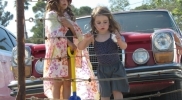



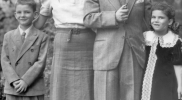
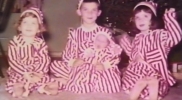
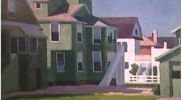
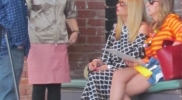


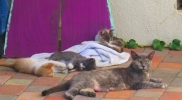

![[000015] [000015]](https://beforetheblog.com/wp-content/gallery/kids/thumbs/thumbs_000015.jpg)
